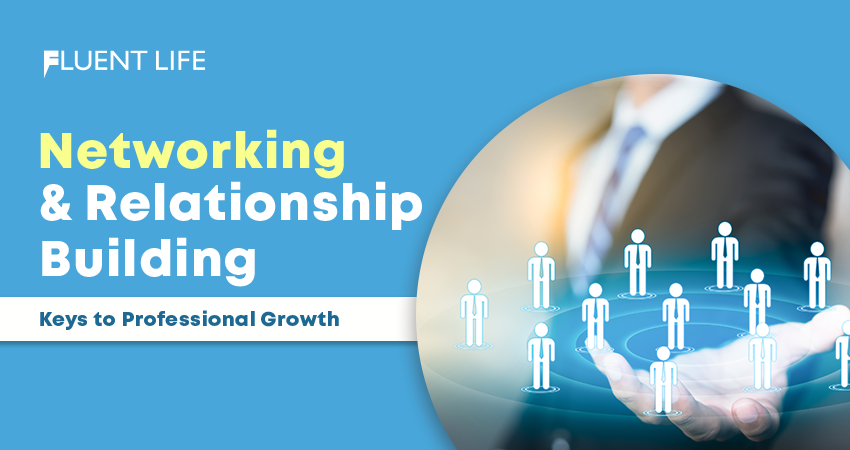Networking and relationship building are essential today. To progress, people must be aware of the power of connections and build significant relationships. This article looks at the importance of networking and relationship building and provides useful information on how they can help with professional development.
Professionals benefit from an interconnected world which requires collaboration and alliances. Networking gives people access to different resources, knowledge, and chances. Forming beneficial relationships provides access to expertise, support, and potential customers. It’s also a great platform for exchanging ideas, gaining new perspectives, and discovering fresh avenues of success.
Authenticity is key when it comes to forming professional relationships. Creating genuine connections based on trust and common values is important for long-term growth. This kind of relationship gives a feeling of trustworthiness and devotion, which leads to collaborations that can boost careers. Additionally, these relationships offer emotional support during hard times, helping professionals cope with challenges.
John Anderson is an appropriate example of the significance of networking and relationship building in professional growth. John was an aspiring entrepreneur who had difficulty succeeding. But, he realized the power of connections early on and changed his career. Through effective networking and forming relationships with key people, John gained industry knowledge and secured multiple partnership opportunities. The trust he established with his contacts enabled him to make remarkable strides professionally.
Importance – Networking and Relationship
To achieve professional growth, leverage the power of networking and relationship building. Discover the benefits of networking and avoid common mistakes that can hinder your progress.
Benefits of Networking and relationship Skills
Networking is key for career progression. It provides many advantages, such as:
- Making Connections: Networking allows people to build contact networks with people from different industries and backgrounds. This broadens their outlook and creates new chances of collaboration and partnership.
- Opportunities: Networking increases their presence in their field and offers access to a wide range of possibilities, like job openings, industry events, talks, and mentorship programs.
- Skill Development: Networking is a platform for sharing knowledge with kindred spirits. This exchange of ideas, expertise, and best practices helps people develop their abilities and stay informed on industry trends.
On top of these advantages, networking also offers special opportunities that can help advance one’s career. It gives people the opportunity to connect with industry experts who can provide invaluable guidance and insight.
For instance, Steve Jobs, co-founder of Apple Inc., utilized networking events to reach out to Silicon Valley pioneers like Robert Noyce and Bill Hewlett. These interactions not only inspired him, but also led to essential partnerships that were the beginning of Apple’s success.
Common Networking Mistakes
Networking is key for career growth, but some missteps can stop your progress. Avoid these pitfalls to optimize your networking efforts and make valuable connections.
- Be ready: The biggest mistake is attending networking events without any preparation. Set clear goals and objectives to get the most out of it.
- Communicate: Poor communication can prevent meaningful connections. Listen actively, engage in conversations, and make an effort.
- Online platforms: Don’t neglect online networking platforms. There, you can find a wide range of professionals and industry insights.
- Follow-up: Building relationships doesn’t end at events. Follow up after initial meetings to open new opportunities for collaboration and growth.
- Focus on others: Networking is a two-way street. Don’t just talk about yourself, show genuine interest in others. This will help develop beneficial relationships.
To succeed in networking, avoid mistakes and foster genuine connections. Acknowledge these blunders and make changes for better chances.
Remember that mistakes can limit access to new opportunities. Don’t be afraid to fix them—take control of your networking journey. Make relationships, seize every chance, and watch your growth skyrocket!
Also Read: Master the Art of Small Talk: Engaging Conversation Tips
Building Networking and Relationships for Professional Growth
To build meaningful relationships and grow professionally, utilize the power of networking events. Expand your network by applying these tips for building meaningful relationships. Understand the significance of networking events to enhance your professional growth.
Tips for Building Meaningful Networking and Relationships
Creating meaningful relationships is paramount for professional success. Here are some tips to help you:
- Talk openly: Speak honestly with your colleagues, clients, and stakeholders. This will form a basis of trust and understanding.
- Show interest: Take the time to get to know people on a personal level. Showing genuine interest will make them feel valued.
- Be proactive: Reach out and make connections. Attend networking events, join professional organisations, and actively search for chances to meet new people.
Also, remember that forming relationships is a continuous process. It takes effort from both parties, and it takes time to build lasting connections.
For me, I formed a strong bond with a coworker by listening to and understanding their point of view. Through regular chats and collaborative projects, we built a mutual trust and respect.
Having relationships not only helps with your career growth, it also creates a supportive network to help you face the difficulties of your career path.
Understanding the Power of Networking Events
Networking events have the potential to bring countless opportunities for professional growth. Talking to like-minded people in these gatherings gives a platform to share ideas, seek advice, and form connections. These events gather professionals from different industries and backgrounds, making collaboration and knowledge-sharing possible on a large scale. It’s a great chance to expand one’s network and learn from experts.
Attending networking events allows individuals to explore outside their usual circles. Participating in conversations and discussions can help learn about different perspectives and approaches which can be beneficial to one’s expertise. Plus, renowned speakers often join in to share experiences and insights, offering valuable lessons.
Moreover, networking events provide immense potential for career development. Building relationships with influential people in an industry can open doors to new jobs or partnerships. By creating genuine connections, professionals could get insider knowledge or get referred for job openings not openly advertised.
It’s important to note that networking events are not only limited to face-to-face interactions. In the digital age, virtual networking events have become popular and convenient. These online platforms offer a virtual space where people can connect from across the globe. Through webinars, panel discussions, and virtual meetups, digital networking events have the same benefits as physical ones while eliminating geographical limitations.
According to Forbes, 85% of professionals believe that face-to-face interactions build stronger relationships than any other form of communication. Thus, attending networking events is crucial for professional growth as it helps build meaningful connections and gain valuable insights. Take advantage of these powerful platforms and unlock your full potential in the professional world.
Also Read: Conversational Etiquette Tips: Do’s and Don’ts in English
Leveraging Technology for Networking and Relationship Building
To leverage technology for networking and relationship building with social media platforms, online networking communities, and forums is a solution for professional growth. These sub-sections provide opportunities to expand your network, connect with like-minded individuals, and share expertise within virtual communities.
Utilizing Social Media Platforms
Platforms, like LinkedIn, Twitter, and Instagram, have unique usage.
For example, LinkedIn is for professional networking, job search, and sharing industry insights. Twitter is great for rapid information sharing and engaging in conversations with thought leaders. Lastly, Instagram allows for creativity, visual storytelling, and building brand personality.
Moreover, utilizing social media gives professionals visibility in their field and helps them establish themselves as experts. Posting relevant content and engaging with others is an excellent way to build credibility and attract potential clients or employers.
Plus, social media platforms grant access to targeted communities and groups. This lets professionals join discussions on topics that interest them and connect with other like-minded individuals.
A study by the Pew Research Center found that 86% of adults in the United States use social media regularly. This speaks to the immense reach and potential impact of these platforms for networking and relationship building.
Online Networking Communities and Forums
The digital age has changed the way we communicate and form relationships. Online networks and forums have become powerful tools for professionals to extend their reach and make valuable connections. By entering these virtual worlds, individuals can interact with like-minded people, exchange ideas, get advice, and create partnerships.
Individuals from multiple industries come together in these online networks and forums. They serve as an idea hub, where folks can learn from one another’s experiences and get insider knowledge. The conversations in these communities also help to engage and promote professionals’ personal brands.
What makes online networks and forums distinct is the ability to connect with those who have specialized expertise or fresh insights. These platforms provide groups where people with similar interests or objectives can collaborate, resolve issues, and build strong relationships. Through participating in these hubs, professionals can enlarge their network beyond typical offline channels and access a huge source of knowledge.
Not only does technology-based networking open new opportunities, it also capitalizes on FOMO (Fear of Missing Out). As industries develop quickly, staying up to date with the latest developments is key for career growth. Online networks offer real-time conversations about industry news, innovative technology, and emerging prospects. By engaging in these talks, professionals can stay ahead of the game and not miss out on essential information that could shape their future.
Also Read: The Role of Humor in Engaging English Conversations
Overcoming Challenges in Networking and Relationship Building
To overcome challenges in networking and relationship building, equip yourself with effective strategies. Maintain authenticity, build trust, and handle rejection gracefully. These sub-sections delve into the nuances of dealing with rejection, maintaining authenticity, and building trust to help you navigate the complexities of professional networking and relationship building successfully.
Dealing with Rejection
Navigating rejection is a must for networking and relationship building. To make it through challenges, use these key tips:
- Be resilient. Rejection can be tough, but don’t let it stop you from reaching your goals! See it as a learning opportunity and use it to grow.
- Adapt. If you’re rejected, evaluate your strategies and change what needs changing. Think about what went wrong and try new approaches.
- Ask for feedback. Reach out to those who turned you down for advice. Their opinions will help you improve in the future.
- Be professional. Even when you’re rejected, stay respectful. It will leave a good impression and could lead to more opportunities.
Everyone has to deal with rejection at some point. Use these tips to turn it into a chance to improve. Being resilient, changing strategies, seeking feedback, and staying professional are all essential for success.
Maintaining Authenticity and Building Trust
Authenticity and trust are essential for networking and relationship building. This means being true to ourselves, showing our values and beliefs, and being consistent in our words and actions. To achieve this, self-awareness is vital. We must be honest about our strengths and weaknesses. Also, we must keep our promises, meet deadlines, and honor commitments. Active listening is also important, as it shows respect and empathy.
A great example of authenticity and trust is Sarah, a successful entrepreneur. Despite her success, she stayed humble and approachable. She shared her struggles openly with her team, showing her authenticity. This led to stronger relationships and ultimately contributed to her company’s success.
Also Read: How to Avoid Common Mistakes in English Conversations
Success Stories: How Networking and Relationship Building Led to Professional Growth
To achieve professional growth, utilize real success stories as a guide. Learn how networking and relationship building have paved the way for professional development. Discover the power of networking through case studies: From Networking to Job Promotion and Building a Strong Professional Network and Business Connections.
Case Study 1: From Networking to Job Promotion
Networking and relationship building can have a major influence on professional success, as shown in the case study below.
Case Study 1: From Networking to Promotion
| Date | Event | Outcome |
|---|---|---|
| 2018-03-01 | Attended industry conference | Met influential people |
| 2018-03-15 | Participated in networking events | Developed connections |
| 2018-04-01 | Helped organize charity fundraiser | Formed relationships |
| 2018-05-01 | Promoted to managerial position | Acknowledged efforts |
In addition to attending conferences and networking events, this individual organized a charity fundraiser. This philanthropic activity enabled them to build relationships with senior executives, boosting their professional network.
This success story shows the power of networking and relationship building. By actively engaging with industry professionals, taking part in events, and making contributions outside of work, advancement opportunities may appear.
Case Study 2: Building a Strong Professional Network and Business Connections
Networking and relationship building are key for success. Here’s a case study to prove it!
- Step 1: Identify networks and events relevant to your field. Join relevant forums, conferences, and online communities. Attend events to meet like-minded professionals.
- Step 2: Reach out and start conversations. Ask open-ended questions to learn about people. Show enthusiasm and offer help when possible.
- Step 3: Follow up and stay connected. Exchange contact info. Send personalized messages or emails expressing gratitude. Engage on social media platforms and professional networking sites.
- Step 4: Provide value and contribute. Share your knowledge or insights. Offer help or resources to showcase expertise and trustworthiness.
- Step 5: Nurture relationships. Schedule check-ins or meetings and stay in touch. Seek ways to add value with recommendations, referrals, or support.
Sarah was an ambitious entrepreneur who understood the power of networking. She attended industry seminars and connected with influential figures who became her mentors and advisors. This led to new clients, strategic partnerships, and even investment opportunities – helping her business grow.
Also Read: Top 100 Commonly Used A to Z Phrasal Verbs for English Fluency
Conclusion: The Continued Importance of Networking and Relationship Building in Professional Growth
Networking and relationship building are key for professional growth. A strong network gives access to resources, insights, mentorship, and new career paths. It also facilitates the exchange of ideas and collaboration on projects.
Building meaningful relationships with colleagues, supervisors, clients, and mentors boosts job satisfaction, productivity, and career advancement opportunities. Plus, it creates a positive work environment with trust and open communication. This helps teamwork and enables leveraging of the network.
To get the most out of networking and relationship building:
- Prioritize quality over quantity when making connections. Seek genuine relationships with those with similar goals and interests.
- Participate in professional organizations related to your field. Attend conferences and seminars to broaden your knowledge.
- Utilize social media platforms. Connect and engage on LinkedIn. Share content to showcase expertise and attract like-minded professionals.
- Offer support and assistance to others in your network. Being helpful and responsive strengthens relationships and boosts their perception of you. Know More – The Fluent Life
Frequently Asked Questions
Q1: What is networking?
A: Networking refers to the process of building and nurturing relationships with other professionals in your field or industry. It involves connecting with individuals who can provide support, advice, opportunities, and valuable connections for professional growth.
Q2: How can networking benefit my professional growth?
A: Networking can benefit your professional growth by providing access to job opportunities, industry insights, mentorship, and knowledge sharing. It allows you to expand your professional circle, gain visibility, and learn from experienced individuals who can help you advance in your career.
Q3: How do I start building my professional network?
A: To start building your professional network, you can attend industry events, join relevant professional associations or organizations, participate in online communities, and leverage social media platforms like LinkedIn. Networking also involves reaching out to colleagues, mentors, and acquaintances to establish and maintain connections.
Q4: How can I maintain and strengthen my professional relationships?
A: To maintain and strengthen your professional relationships, it is important to stay in touch regularly. This can be done through email, phone calls, coffee meetings, or attending professional gatherings. Actively listening, offering help, sharing resources, and showing genuine interest in others’ success are key to nurturing long-lasting professional relationships.
Q5: Can networking help me find job opportunities?
A: Yes, networking can greatly assist in finding job opportunities. Many job openings are filled through referrals and word-of-mouth, which often happen within professional networks. By expanding your network and actively engaging with your contacts, you increase your chances of learning about hidden job opportunities and getting recommended for suitable positions.
Q6: Are there any online platforms that can enhance my networking efforts?
A: Yes, there are several online platforms specifically designed for professional networking. LinkedIn is an excellent platform to establish and grow your professional network. Other platforms such as professional forums, industry-specific websites, and networking apps can also be valuable in connecting with like-minded professionals.






